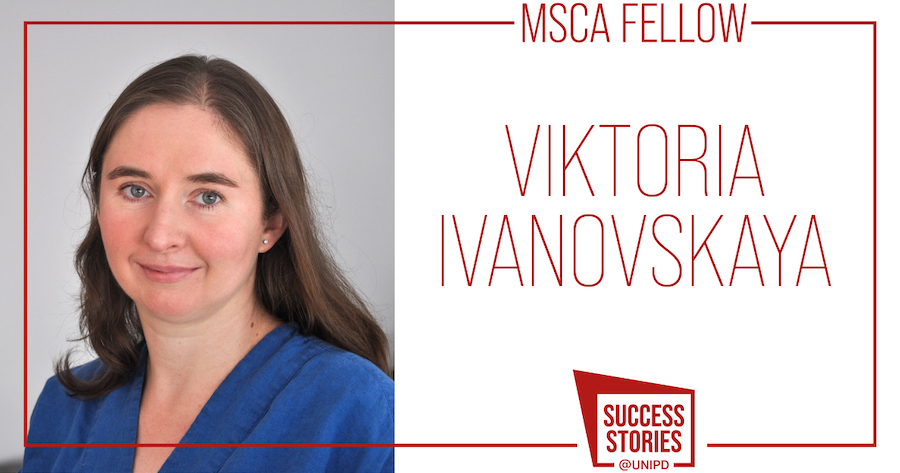
MSCA Fellow: Viktoria Ivanovskaya
Nature is way wider than your imagination!

Viktoriya has a doctorate in computational physico-chemistry and her research focuses on modeling the structure and on physical-chemical properties of systems at the molecular and nanometric scale.
“Some years ago I had to take a break of several years. I thought this long interruption would put an end to my scientific career, but then I found that the Marie Skłodowska-Curie Action- Career Restart panel might be a very effective opportunity to reintegrate into the European research community”.
Doing science is always like working at a frontier: you do not actually know what lies beyond it. Once you achieve what you find is a nice theoretical result, here come some better experiments along the way, to remind you that nature is way wider than your imagination.
Can you tell us something about your research path so far and why did you choose to apply for a MSCA-IF?
My research focuses on modeling the structure and on physical-chemical properties of systems at the molecular and nanometric scale. This is why I perform extended computer simulations, which are based on fundamental quantum mechanical descriptions of the interactions between the atoms.
I did my studies in Russia, where I obtained a degree in chemistry and then a doctorate in computational physical chemistry. During my PhD I spent some time in Germany where I later went back for a first post-doc. After a few years I moved to France, where I lived for ten years working in several research institutions around the country.
At one point I had to take a break for personal reasons and stopped doing research for several years. I had been thinking this long interruption would have put an end to my scientific career, but then I found that the MSCA Career Restart might be a very effective opportunity to reintegrate into the European research community. I submitted a project with the University of Padua, and I am very happy it has been successfully evaluated and that I am here now.
Your publication record is pretty long already and comprises both 62 research articles and 4 book chapters. Has this helped in the evaluation process?
The Marie Skłodowska Curie program is very competitive and a good publication record certainly helps. In my case I suppose that having switched from one subject to another (ed. note: from chemistry to computational physical chemistry) could have demonstrated a certain capability of producing original results even within a relatively limited time frame. However, the applicant’s curriculum is just one of the many aspects that are evaluated. The host group and institution and their capacity of improving the human potential of the candidate are equally or even more important.
Why did you choose the University of Padua as your host institution?
Padua is a very well-known university and the excellence of the chemistry department has been recently recognized. Given the importance that the host institution has in the evaluation process, these are relevant aspects to take into account when choosing where to apply. However, the most important aspect for me was the research I could do here. My host group, with whom I had already friendly relationships, is a specialist on the growth of molecular systems at surfaces and their organization in complex structures. In my career I tackled a number of topics in materials and nano-science, but carbon materials have been the topic to which I dedicated most of my time, even if I had to leave it aside for a while. Working on carbon somehow feels like a homecoming for me.
Your project deals with frontier nano-electronics technologies. Was this a strength of your project proposal?
Doing science is always like working at a frontier, and what lies beyond such frontier, we don’t actually know. I am working on systems that certainly have an original electronic behavior, but nobody can say with certitude that they will drive to new nano-electronics technologies. Undoubtedly, there is a technological potential in this direction that is worth exploring and this has been recognized as a strength of the project. However, crossing the border of supra-molecular organization at surfaces might lead us to very different paths.
Your work seems to be able to combine theory and practice very efficiently, which I suppose is a not so common quality for a research project. Was this aspect particularly appreciated by the MSCA committee?
I am a theoretician but I did almost all my works in collaboration with or directly integrated into experimental groups. I always felt this proximity with experimentalists very enriching and it has been a much appreciated element in a project with a theoretical core. On one side, predictive modeling can provide some clues to the experimental research. On the other side, experiments can provide the necessary validation of the theoretical approaches employed and stimulate the most pertinent directions to which the theoretical modeling should be addressed. Once you reach an interesting theoretical result, some better and more challenging experiments will come your way and remind you that nature is always wider than your imagination...
International Research Office
via Martiri della libertà 8, 35137 Padova, Italy
tel. +39 049.827 1947 / 1948 / 1945
fax +39 049.827 1911
international.research@unipd.it


